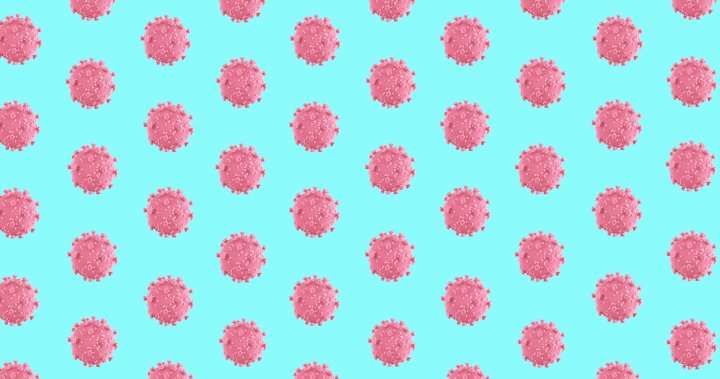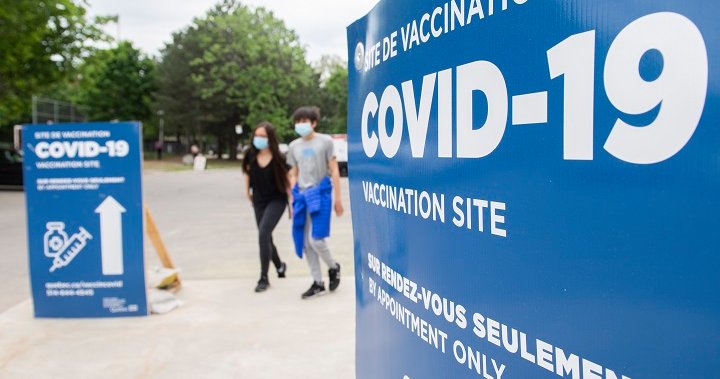As COVID-19 restrictions start slowly lifting across the world, some countries are telling people they need to learn to live with the virus — as it’s not going anywhere.
That’s because unlike viruses like polio or measles (that have been largely been wiped out in rich countries), the coronavirus has different characteristics, making it difficult to eliminate, even with the help of vaccines.
“COVID-19 cannot be eradicated, it’s impossible,” said Dr. Peter Juni, a professor of medicine and epidemiology at the University of Toronto and scientific director of Ontario’s COVID-19 Science Advisory Table. “It’s not the same as the measles, it’s more like influenza.”
Read more:
The Lambda COVID-19 variant is in Canada. How worried should we be?
With this in mind, countries like Britain and Australia have moved away from the “COVID zero” approach and are focusing on ways to safely live with the virus, like the seasonal flu.
Earlier this month, Australia announced a phased approach in lifting COVID-19 restrictions. Under this plan, Prime Minister Scott Morrison said, the country will eventually treat COVID-19 “like the flu” once vaccinations rates hit 80 per cent in the country.
“We get this done, Australia, and you can see what’s on the other side,” he said. “When it is like the flu, we should treat it like the flu and that means no lockdowns.”
And in early July, Prime Minister Boris Johnson also said that despite rising COVID-19 cases in the country, Britain would have to “learn to live with this virus.”
Why COVID-19 is different than smallpox, measles
Smallpox is one of the few diseases that has officially been eradicated, but other viruses like polio and measles have been largely controlled in Western nations.
To wipe out viruses, they have to exhibit certain characteristics: they need to be exclusively circulating in humans, they need extremely effective vaccines and they tend to be viruses that don’t mutate, according to Matthew Miller, an associate professor at McMaster University’s department of biochemistry and biomedical science.
“Viruses like smallpox, polio and measles fall into that category,” he explained. “Coronaviruses are intrinsically different, they jump from animal to humans … can mutate to evade immunity, which makes it very challenging to eradicate a virus like that.”
Read more:
Herd immunity — how it works and why it’s a lofty goal for COVID-19
SARS-CoV-2, the virus that causes COVID-19, may be an endemic virus, and “something will have to learn to live with,” Miller said.
“I don’t think we will have a choice in the matter.”
Trying to eliminate the virus with the “COVID-zero” ambition is not realistic given the biology of the virus, he said.
The “COVID zero” approach involves countries imposing fairly strict measures until community transmission reaches zero. The goal is to eliminate the virus, rather than manage it.
But treating COVID-19 like an eradicable disease is not possible due to the virus’s characteristics, Juni argued.
“Measles is even more transmissible, but if you have had the measles or got a vaccine, that gives you a long-term immunity,” Juni said.
“But with the coronavirus and Delta variant we may need booster shots, and if you have had an infection earlier on the pandemic, you are not protected against Delta, you still need to get vaccinated.”
Why COVID-19 is more like influenza
Both Juni and Miller argue that COVID-19 might be here to stay, and treating it like the seasonal flu may be a more viable approach to managing the virus.
For this to work, experts say vaccination is imperative, especially with more transmissible variants such as Delta and Lambda spreading around the world.
Lifting restrictions too early — before enough people are vaccinated — could lead to a spike in COVID-19 cases, Juni warned.
“This is because Delta is so transmissible,” he explained. “If this was the Alpha variant this would be game over, but Alpha is about to go extinct… Delta is a completely different game.”

Previously, countries like Canada said they may require up to 60 to 70 per cent of their population to be fully vaccinated before potentially reaching herd immunity.
However, with the introduction of a new transmissible variant, Juni said the numbers have to adjust.
With the Delta variant, because it spreads more easily and can make vaccines less effective, he said herd immunity may not be possible until over 90 per cent of the population is vaccinated.
“Once we achieve a very high rate of vaccination, roughly 93 per cent of people need to be immune against Delta…. This is a moment where we start to see a situation that will be comparable with influenza. But we first need to make it there,” he said.
Currently, 79.2 per cent of Canadians aged 12 years and older have received at least one jab, and a little over 50 per cent have received both doses, according to COVID-19 Vaccination Tracker.
As long as more Canadians keep getting vaccinated, Miller also believes the country can reach a point of normalcy where COVID-19 is more like seasonal influenza.
Canadians under 12 still don’t have an approved vaccine available to them. While clinical trials for the age group are underway, Pfizer says the results aren’t expected until late September or even October.
Still, Miller said this doesn’t put a massive wrench in the plans to get back to normal.
Read more:
Fully vaccinated against COVID-19? Canada unveils new guidance on what you can, can’t do
Unlike the flu, Canada will need a higher inoculation rate for COVID-19 because it spreads more efficiently, Miller stressed, adding that he hopes the coronavirus vaccines will provide protection past a single season.
“That will have a major effect on maintaining high levels of population-level immunity,” he said. “Because as the pandemic fizzles out, the rate at which coronaviruses mutate is significantly slower than the rate that flu mutates.
“So right now we are seeing variants pop up, not because the virus mutates so quickly per se, but because so many people are infected.”
— With files from Global News’ Rachael Gilmore
View link »
© 2021 Global News, a division of Corus Entertainment Inc.








